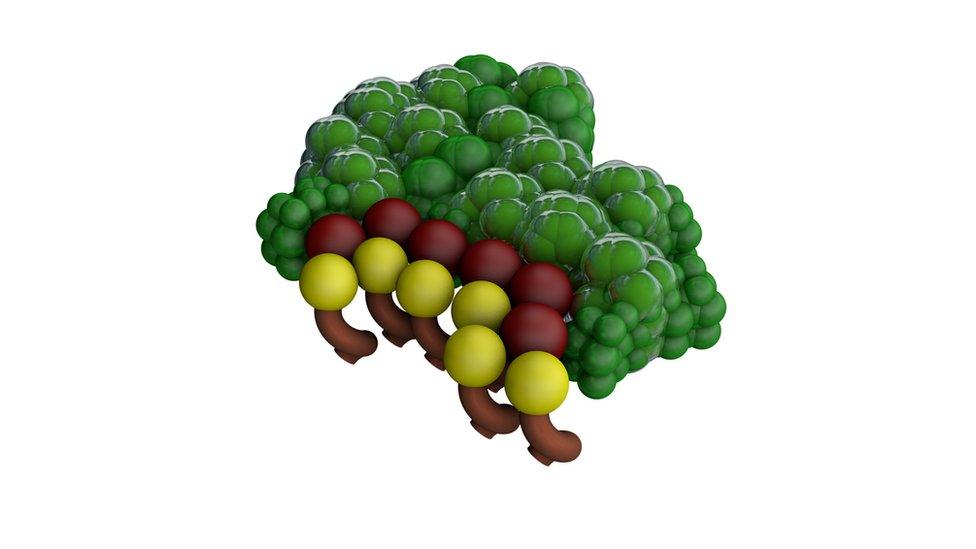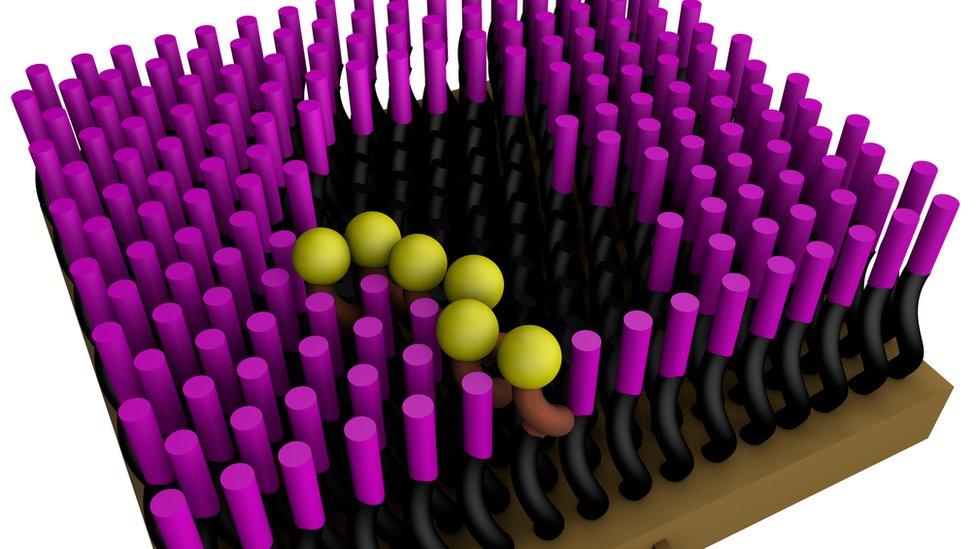Birmingham researchers build a new test for prostate cancer
- Published

Higher levels of PSA in your blood are a sign of cancer. Traditional tests detect the green protein, but the new one detects a sugar, shown as dark red
If you have any doubts or worries about your prostate, then it's important to go to your doctor and get tested.
The good news is that there's a simple blood test that can be carried out before anything more invasive is done. The bad news is the test is, as one cancer survivor told me, a bit "rubbish".
The problem is, the existing test can miss the signs of cancer in about a quarter of patients, meaning it's not detected until much later.
Sometimes the test returns a false positive, which means enduring procedures like a biopsy only to find out there was no need for them.
At the University of Birmingham, chemical engineers and chemists have been working on a new test. It would be much more accurate and could potentially be turned into tests for other cancers, and even diseases like Alzheimer's.
Not sensitive enough
The current blood test looks for a chemical called prostate-specific antigen, or PSA. Higher levels of PSA are a sign you could have prostate cancer.
If you zoomed in on PSA under a very high-powered microscope, then you'd find it is made of a big protein with a sugar molecule on the side.
It comes in around 60 different forms, all with the same protein but with different sugars attached. The problem is, not all of these different forms of PSA are a sign of cancer.
The standard test just detects the protein and so it lumps together all the different varieties of PSA, sometimes overwhelming the signs of cancer, which means it isn't as sensitive as doctors would like.
The researchers in Birmingham realised they could create a new test that doesn't look for the protein part of PSA but for the sugar part instead.
That means you can narrow down your search so you don't detect all 60 varieties, but only the four or five that are most closely associated with prostate cancer.
The end result?
Well, where the current test sees low levels of PSA and gives a negative result, the new test can go further.

Only the specific PSA we want to test for will drop into the black hole and lock onto the yellow molecules
So when there's a low PSA level, but there's a high percentage of PSA made of the sugars associated with cancer, the new test spots that and gives a positive result. It's a much more accurate test.
Improve cancer detection
To make the test, you take a sample containing the forms of PSA you want to find and add an acid that grabs onto the sugar. Then use chemical engineering to lock it all down onto a piece of gold.
The PSA is then washed away and you're left with a hole, edged by molecules, that only fit the PSA with the sugars we want.
Add your blood sample, and any cancer-indicating PSA drops into the hole and is detected.
This is just the start. You could use the same approach to create blood tests for other cancers, such as ovarian cancer and even a form of early detection for a disease like Alzheimer's.
So far, the test has been tried on real samples, if not real patients, but it does seem to work.
Excitingly, this research has been spotted by Alta Innovations, external which is a new company owned by the university, whose purpose is to speed up the commercialisation of this sort of work.
As the CEO told me, it can take between five and 18 years for innovations to get from the lab to the real world, but with Alta's involvement they hope to reduce that to three years, or even less.
Initially, the idea is to create a more accurate, laboratory-based service to improve prostate cancer detection.
But one day, if all goes well, your doctor's surgery could have a single machine that detects various different diseases from a small sample of your blood.